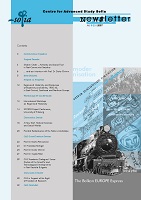
CAS Newsletter 2007 / No 1-2
Articles, pictures and interviews can be reprinted only with the consent of Centre for Advanced Study Sofia (CAS - Sofia). Any citations should be duly acknowledged.
More...We kindly inform you that, as long as the subject affiliation of our 300.000+ articles is in progress, you might get unsufficient or no results on your third level or second level search. In this case, please broaden your search criteria.

Articles, pictures and interviews can be reprinted only with the consent of Centre for Advanced Study Sofia (CAS - Sofia). Any citations should be duly acknowledged.
More...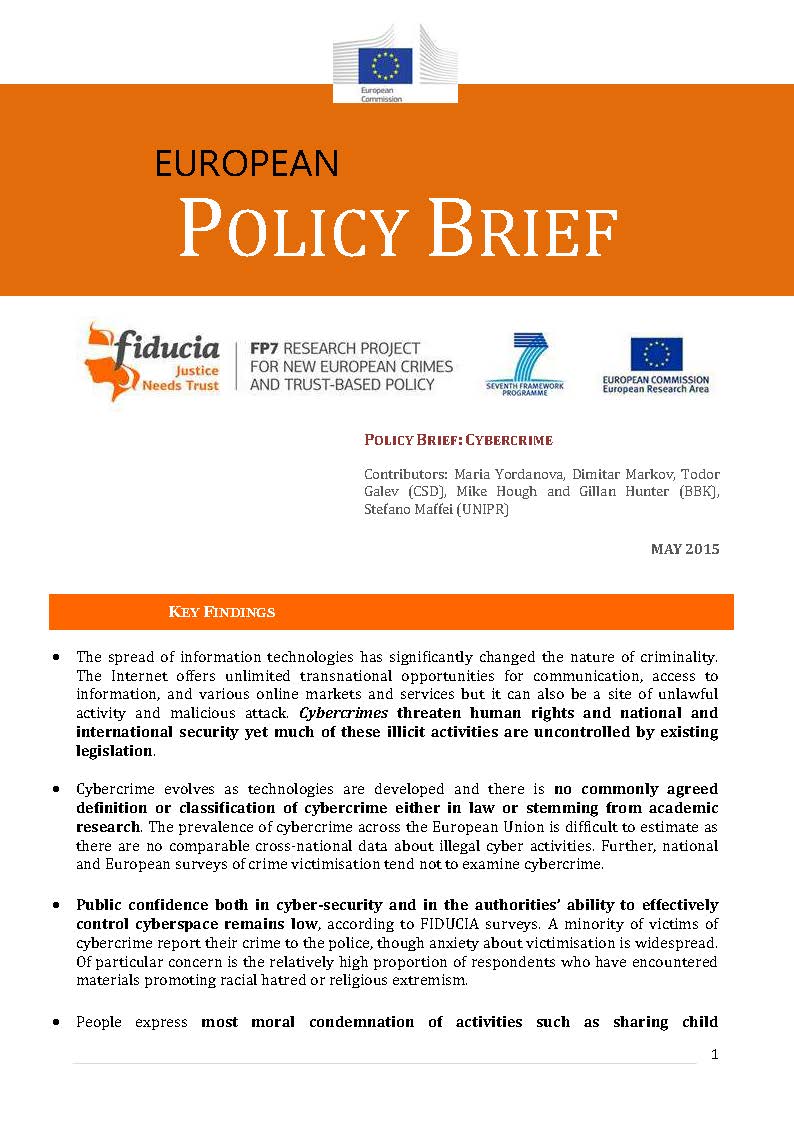
This Policy Brief summarises key findings from the FIDUCIA cybercrime survey, conducted in selected member states, but it also provides an overview of existing data and research on the prevalence of cybercrimes and the public attitudes towards them. The role of current national and European legislation, policies and practical measures are assessed in terms of their deterrent or preventative effects and the potential role for cross-national cooperation and self-regulation to control or prohibit cybercrime are reviewed.
More...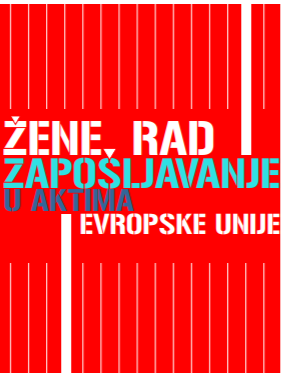
Legal framework of the European Union confirms its determination towards gender equality. Over the last decades there has been developed a series of provisions of primary and secondary law of the EU as well as a large number of political documents and initiatives in the field of gender equality, particularly in the field of employment and work conditions. Case law of European Court of Justice has contributed to the great extent to development of European law in this field. The EU point out a few important fields putting them in its focus of actions: first of the fields refers to employment, in particular, access to employment, promotion at work including the access to professional training as well as working conditions, including the redundancy conditions. The second refers to equal work or work of equal value, the third to harmonization between private and professional life and a special protection of pregnant women and maternity leave. The European Union recognizes the importance of introduction of measures of an affirmative action aimed at accomplishing the goals in these fields. In the field of equality between women and men, over the last decade there has been adopted a numerous of directives which have been changed and amended over time. Directives that can be directly linked to the issue of work and employment are, inter alia: Directive of Council 79/7/EEC of 19 December 1978 on the progressive implementation of the principle of equal treatment for men and women in matters of social security; Directive of Council 2004/113/EZ of 13 December 2004 on implementing the principle of equal treatment between men and women in the access to and supply of goods and services, i.e. service provision; Directive 2010/41/ EU of the European Parliament and of the Council of 7 July 2010 on the application of the principle of equal treatment between men and women engaged in an activity in a self-employed capacity and repealing Council Directive 86/613/EEC; Directive 2006/54/EC of the European Parliament and of the Council of 5 July 2006 on the implementation of the principle of equal opportunities and equal treatment of men and women in matters of employment and occupation (“The Recast Directive” ). Except the mentioned, it is important to point that the EU has adopted a series of directives relating to the rights of pregnant and postpartum women, then maternity, parenting and paternity based rights amongst which the key important are Directive 92/85/EEZ (“The Pregnant Workers Directive”) Directive2010/18/EU of 8 March 2010 (“The Parental Leave Directive”). Also, the European Court of Justice, as the EU institution whose task is to interprets EU law to make sure it is applied in the same way in all EU countries, the most frequently in a liberal manner than courts of member states do at the time of decision- taking, has given a great contribution to the process of advocating the promotion of women at labour market including those related to different forms of discrimination against women. The possibility to use the EU law on gender equality in court proceedings before national courts of member states represents a powerful instrument for protection and accomplishment the right to equality whether the EU law is integrated into national legislation or not. In fact, member states are often late with transposing or, sometimes, do it in a way being opposed to goals which some directives try to achieve. However, due to the principle of supremacy of European Union law, in case of inconsistency of national legal regulations with the EU regulation and in accordance with the European Court of Justice’s decisions, national courts of member states are compelled to base its decision on the EU regulations, i.e. are compelled to do everything in its power to achieve the result the directives’ goals strive to by interpreting the national law. Except legal documents and court justice of the European Court of Justice, political documents of the European Union too represent a significant resource, especially in terms of determining the directions and actions in the field of gender equality. One of such documents, which was adopted in the aim of promoting the equality between women and men is a Women’s Charter. The Charter highlighted the five specific fields of actions necessary to take additional efforts to confirm the dedication of Europe to equality of women and men offering a better life and sustainable future for all: Economic independence; Equal pay for equal work or work of equal value; the representation of women in decision-making and positions of power, respect for women’s dignity and integrity, but also an end to gender-based violence, both in the European Union and outside the EU borders. Although, after reading the legal documents of the European Union it could be argued that equality of women and men is the fundamental value, the goal and the driver of the European Union’s economic growth and that the EU in all its actions is trying to promote the equality of women and men, things are often different in practice. Decisions of the Court of Justice confirm that even long-year member states face difficulties when implement the principle of gender equality and the prohibition of discrimination as general principles that the European Union is based on. This is why the European Union is trying to make a positive impact on promoting the equality of men and women and gender equality not only in member states but in EU accession process countries. In that sense, the EU requires the adjustment of a candidate country’s legislation to the EU legislation. Member states are, except adopting the laws, obliged to take measure aimed at revoking all laws, regulations or proceedings which are not in accordance with the principle of equal treatment. Each provision being opposed to the mentioned principle and is part of employment contract, collective agreement, employment internal act, a regulation being applied to self-employed occupations or organizations of workers and employers are, accordingly, declared null and void and must be amended.
More...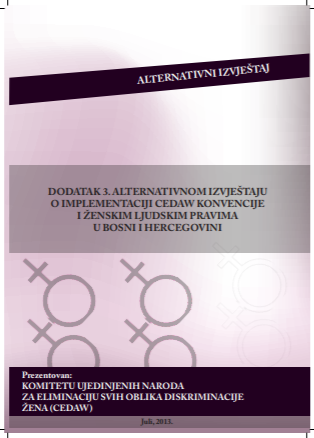
Dodatak trećem alternativnom izvještaju je nastao kao rezultat zajedničkih napora grupe aktivistkinja i aktivista iz nevladinih organizacija u Bosni i Hercegovini sa dugogodišnjim iskustvom u direktnom radu sa ženama čija su prava ugrožena ili direktno povrijeđena, kao i aktivnostima zalaganja za usvajanje rodno osjetljivih i odgovornih zakona i javnih politika u oblasti zaštite ženskih ljudskih prava i ravnopravnosti polova.
More...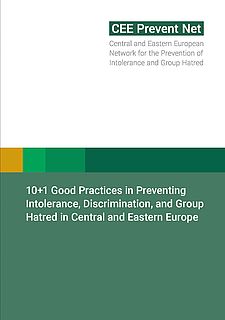
This compendium was created by the consortium members of the CEE Prevent Net initiative. Its development is the result of a robust exchange of good practice methods among various organizations and civil society actors in the areas of youth work and (non-formal) education aimed at preventing intolerance, discrimination, and right-wing populism and extremism in the region of Central and Eastern Europe. Initially, this volume was supposed to present 10 good practices for working with young people directly; however, the CEE Prevent Net network decided to expand this initial enterprise gratuitously. This additional section provides youth workers, educators, and other civic actors with recommendations and advocacy strategies for youth work that fosters tolerance, facilitates dialogue, and prevents discrimination and far right ideologies.
More...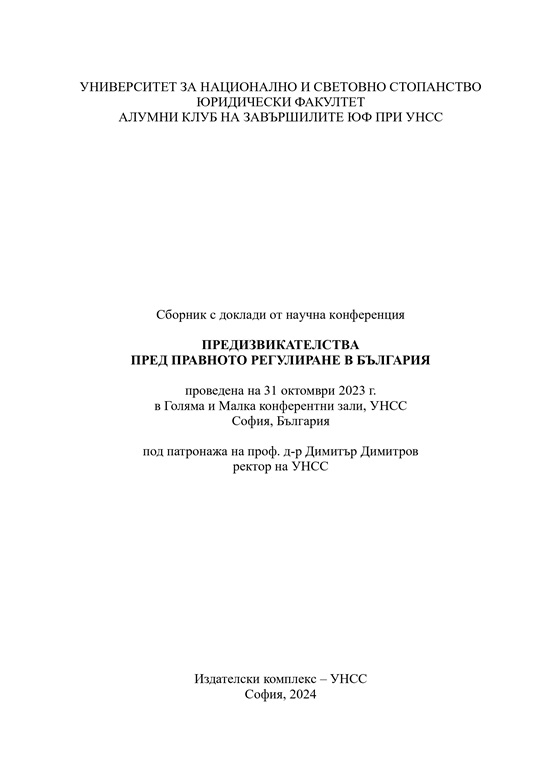
The draft amendment to the Constitution of the Republic of Bulgaria from 2023 contains numerous proposals that are within the competence of the Grand National Assembly. This conclusion is based on a comparison of the content of proposed changes with the established practice of the Constitutional Court of the Republic of Bulgaria regarding the "form of government" in the sense of Art. 158, item 3 of the operation of the Constitution. It is indisputable that the discussion needs to be changed in the Basic Law and if it is to be entirely political in nature. But in view of the basic constitutional principles - rule of law, people's sovereignty, separation of powers and independence from the judiciary, proclaimed in the Basic Law, the political decisions of this discussion should undoubtedly be in line with them.
More...
It is a fundamental rule in the constitution of a democratic state to contain provisions related to changes to the basic law. Such was the understanding of the creators of the Constitution of the Republic of Bulgaria from 1991, who provided for such a legal regulation. It is contained in Chapter Nine of our basic law, entitled "Amendment and addition to the Constitution. Adoption of a new Constitution" - Art. 153 to Art. 163. Challenges in legal regulation related to changes in the Constitution are outlined according to material criteria and are fastened with special procedural guarantees in our basic law. In the exposition below, attention will be paid to some main points contained in the constitutional legal framework for revision of the Constitution by the National Assembly. The very fact that this activity is different from the usual daily legislative function of the parliament shows that the National Assembly is faced with the challenge of carrying out the changes in the basic law, considering all the features and specifics laid down in the constitutional law.
More...
The report presents the general and special principles of the EU law that should be observed when legislation of public procurement by the EU and by the Member States is passed, and those that are directly related to the implementation of such legislation. Related case law of the CJEU is reviewed. Adherence to the stated principles is important, on one hand, for guaranteeing the public interest in the Union and in the Member States, and on the other hand, for the functioning of the internal market and for the competition between the businesses operating in this market. The main role in the mentioned processes is played by the member states, which are obliged to transpose the legislation of the Union, and to ensure its application and enforcement in public procurement procedures, in compliance with the general and special principles established in the EU law.
More...
The article examines the general situation related to the principle of sound financial management with a view to its regulation at the European and national level. Particular attention is paid to the cumulative presence of the three components of the principle, in particular the principle of economy, effectiveness and efficiency. The need for a correct interpretation and specific analysis of the content of these principles in the presence of a legal dispute is presented, so that by means of their lawful application the protection of the financial interests of the European Union can be ensured to the maximum extent.
More...
The paper outlines the concepts of unfair tax competition and aggressive tax planning, which are fundamental to modern international tax law, and briefly presents the related current legal framework for harmonizing corporate taxation in the European Union.
More...
In the context of its comprehensive Information Society policy, in 2022, the European Union (EU) adopted Regulation (EU) 2022/2065 on the Single Market for Digital Services (Digital Services Act). The primary goal of the regulation is to provide a modern, integrated European approach to addressing illegal content, disinformation, or other risks to society in the online space. This publication aims to examine the requirements regarding the independence of national coordinators for digital services in the context of their powers outlined in the Digital Services Act and to make proposals regarding upcoming changes in national legislation.
More...
This paper examines the legal instruments available to creditors for claims against a company with variable capital and more specifically the guarantee function of capital and the possibility of engaging in the personal liability of board members and controlling partners. A conclusion is made about the essence of penetrating liability as a special type of tortious liability, expressly provided for in the law to override the general rule that the company is independently liable for its obligations only with its own property.
More...
The report provides an overview of the emergence of voucher systems for employment in Belgium, France and Canton Geneva (Switzerland), the specifics of their application in each of these countries, the problems that this type of employment solves, as well as its weaknesses, its interdependence with the so-called domestic workers. Outlines the place for its‘ regulation according to the Employment Strategy of the Republic of Bulgaria 2021-2030 to other forms of flexibility as a prerequisite for economic growth. Points to its inevitable interconnection as attypical employment also with the principle of non165 discrimination and the need to transpose Directive No 2023/970 of the European Parliament and of the Council of 10 May 2023. to strengthen the application of the principle of equal pay for women and men for equal work or work of equal value, through pay transparency and enforcement mechanisms.
More...
The text covers issues related to copyright in the context of artificial intelligence (AI). It emphasizes the need for clear legal frameworks to regulate works created by AI, especially in cases involving Strong and Generative AI. The idea is that such programs generate works that don't entirely match the characteristics of human creators. It discusses questions of authorship and rights, proposing various alternatives to resolve conflicts, including granting rights to the programmer or the program itself. The text expresses the need for swift and appropriate legislation capable of justifying and protecting the rights of all participants in the process of creating works through artificial intelligence.
More...
In Interpretative Decision No 5/2021, the SCC ruled on the labour law issue of the application of the new ground for dismissal of pedagogical specialists, in respect of which a contradictory practice of the SCC itself has accumulated since 2016. Since dismissal ground is conviction for a crime, the problem has significant criminal law aspects that the SCC has not taken into account, which is why the argumentation of the decision and the dissenting opinion suffer from serious imperfections.
More...
The report presents and analyzes the problem of the growing role and importance of constitutional justice in Bulgaria in the conditions of political crisis in recent years. The thesis is advocated that in conditions of political crisis, democratic institutions and parliamentary parties are more often inclined to violate the constitution or to use it excessively as a tool for institutional opposition in the political process. As a result, the Constitutional Court becomes a participant in the resolution of political and institutional disputes and conflicts. Cases from constitutional jurisprudence are analyzed, through which challenges and problems facing constitutional justice are highlighted. A political and legal approach is used in the analysis of the studied process.
More...
Among the goals pursued by law are justice, the common good and legal certainty. Legal certainty as a goal of law is also a value of the law itself and is part of its concept. The approach to its definition opens up avenues in different directions to be explored. This report will analyze the various meanings, arising from its main divisions, its main manifestations in the legal system and its main problems.
More...
The current Bulgarian legislation empowers police authorities to detain a person deemed to have committed a crime. Exercising such power, in practice, results in restriction of one of the most important fundamental rights guaranteed by the Constitution of the Republic of Bulgaria, namely, the right to personal liberty and inviolability. A written order is issued for the detained person, which by its nature represents an individual administrative act, and, as such, must meet the five requirements for legality of administrative acts. The present paper focuses on the obligation of the police authorities to observe the substantive law, to state promptly the reasons for detention, as well as to eliminate any form of abuse of power entrusted to them. For the purpose of preventing unlawful and arbitrary detention, police authorities ought to comply with the European Convention on Human Rights and European Union law, as well as take into consideration the relevant case-law of the European Court of Human Rights and the case-law of the Court of Justice of the EU.
More...
This report analyzes the nature of clinical trials of medicinal products. The different forms of control during their implementation are described. Monitoring and auditing are considered as specific forms of non-legal control. A special place is given to the different types of inspections of clinical trials as the only form of ongoing legal control carried out by competent state authorities.
More...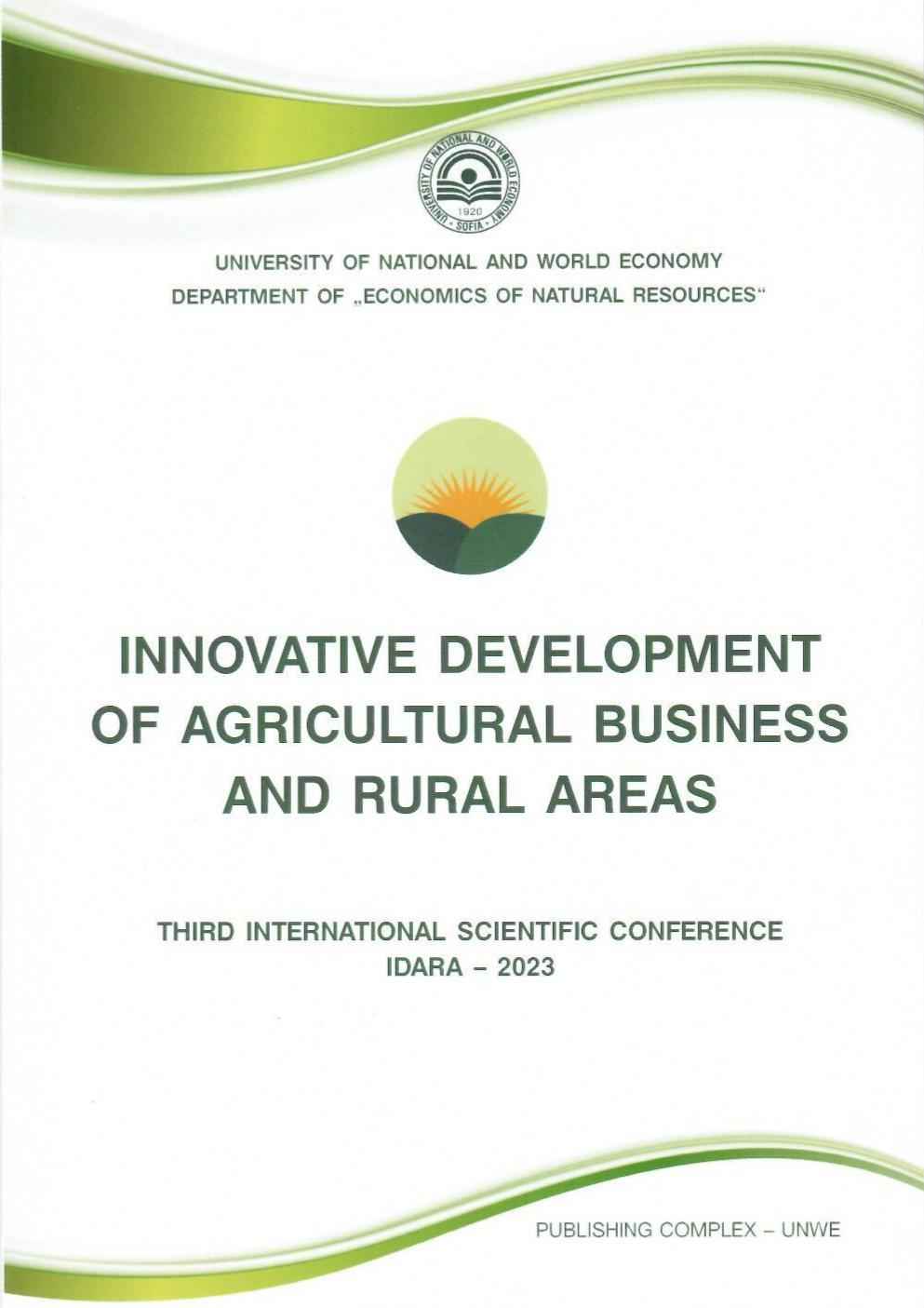
Pursuant to the norm of Article 7, Paragraph 1 of the Law on Assistance to Agricultural Producers (www.lex.bg) [1], the Ministry of Agriculture, Food and Forestry creates and maintains a register of farmers. The registration mechanism is regulated in Ordinance No. 3 of 01.29.1999. [2] to create and maintain a register of farmers (www.lex.bg). Through this registration mechanism, each farmer and each agricultural producer is given the opportunity to obtain the status of a registered agricultural entity, subject to the fulfillment and presence of specific legal conditions. Pursuant to paragraph 1, item 1 of the additional provisions of the Law on Support for Agricultural Producers [1], „Farmers“ are natural and legal persons who produce unprocessed and/or processed plant and/or animal products, and in the sense of point 23 of the additional provisions cited above, „Farmer“ is a farmer within the meaning of Art. 4, paragraph 1, letter „a“ of Regulation (EU) No. 1307/2013 [3]. According to the text of the mentioned Article 4, paragraph 1, item „a“ of Regulation (EU) No. 1307/2013 – Definitions and related provisions, „Farmer“ means a natural or legal person, or a group of natural or legal persons , regardless of the legal status of that group and its members under national law whose holding is within the territorial scope of the treaties. The regulated registration mechanism is characterized by a number of specifics, reflecting both the functions of farmers and agricultural producers according to the cited definitions, as well as the provision in this way of a number of necessary privileges that derive from their registration status.
More...